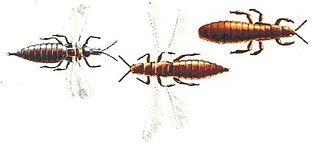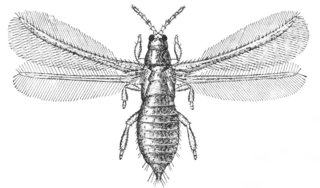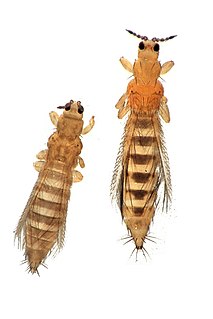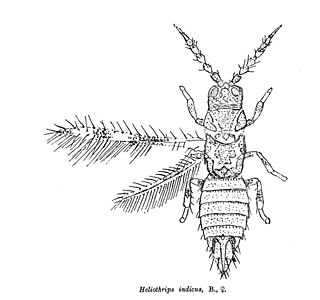
Thrips are minute, slender insects with fringed wings and unique asymmetrical mouthparts. Different thrips species feed mostly on plants by puncturing and sucking up the contents, although a few are predators. Entomologists have described approximately 6,000 species. They fly only weakly and their feathery wings are unsuitable for conventional flight; instead, thrips exploit an unusual mechanism, clap and fling, to create lift using an unsteady circulation pattern with transient vortices near the wings.

Clidemia hirta, commonly called soapbush or Koster's curse, is a perennial shrub. It is an invasive plant species in many tropical regions of the world, creating serious damage.
The Clidemia thrips, Liothrips urichi, is a thrips species from Trinidad. It is used as a biological control agent to stop the spread of Clidemia hirta, an invasive plant species that does much damage in many tropical areas of the world.
The Phlaeothripinae are a subfamily of thrips, with hundreds of genera.

Phlaeothripidae is a family of thrips with hundreds of genera. They are the only extant family of the suborder Tubulifera, alongside the extinct family Rohrthripidae and are themselves ordered into two subfamilies, the Idolothripinae with 80 genera, and the Phlaeothripinae with almost 400. Some 3,400 species are recognised in this family, and many are fungivores living in the tropics.

The Thripidae are the most speciose family of thrips, with over 290 genera representing just over two thousand species. They can be distinguished from other thrips by a saw-like ovipositor curving downwards, narrow wings with two veins, and antennae of six to ten antennomeres with stiletto-like forked sense cones on antennal segments III and IV.

The Aeolothripidae are a family of thrips. They are particularly common in the holarctic region, although several occur in the drier parts of the subtropics, including dozens in Australia. Adults and larvae are usually found in flowers, but they pupate on the ground. While they normally prey on other arthropods, many feed also on flowers.

The Thripinae are a subfamily of thrips, insects of the order Thysanoptera. The Thripinae belong to the common thrips family Thripidae and include around 1,400 species in 150 genera. A 2012 molecular phylogeny found that the Thripinae was paraphyletic; further work will be needed to clarify the relationships within the group.
Liophlaeothrips is a genus of thrips in the family Phlaeothripidae.

Haplothrips is a genus of Phlaeothripid thrips.
Elaphrothrips is a genus of tube-tailed thrips in the family Phlaeothripidae. There are at least 40 described species in Elaphrothrips.
Gynaikothrips is a genus of tube-tailed thrips in the family Phlaeothripidae. There are more than 30 described species in Gynaikothrips.

Heliothrips is a genus of thrips in the family Thripidae. There are about 18 described species in Heliothrips.
Erythrothrips is a genus of predatory thrips in the family Aeolothripidae. There are about 11 described species in Erythrothrips.

Aeolothrips is a genus of predatory thrips in the family Aeolothripidae. There are more than 80 described species in Aeolothrips.
Merothrips is a genus of thrips in the family Merothripidae. There are about 19 described species in Merothrips.
Selenothrips is a genus of thrips in the family Thripidae. There are at least two described species in Selenothrips.
Hermann Priesner was an Austrian professor of natural history and a specialist on the thrips although he also took an interest in other groups such as Hymenoptera, and Hemiptera.
Megalurothrips is a genus of thrips belonging to the family Thripidae.








